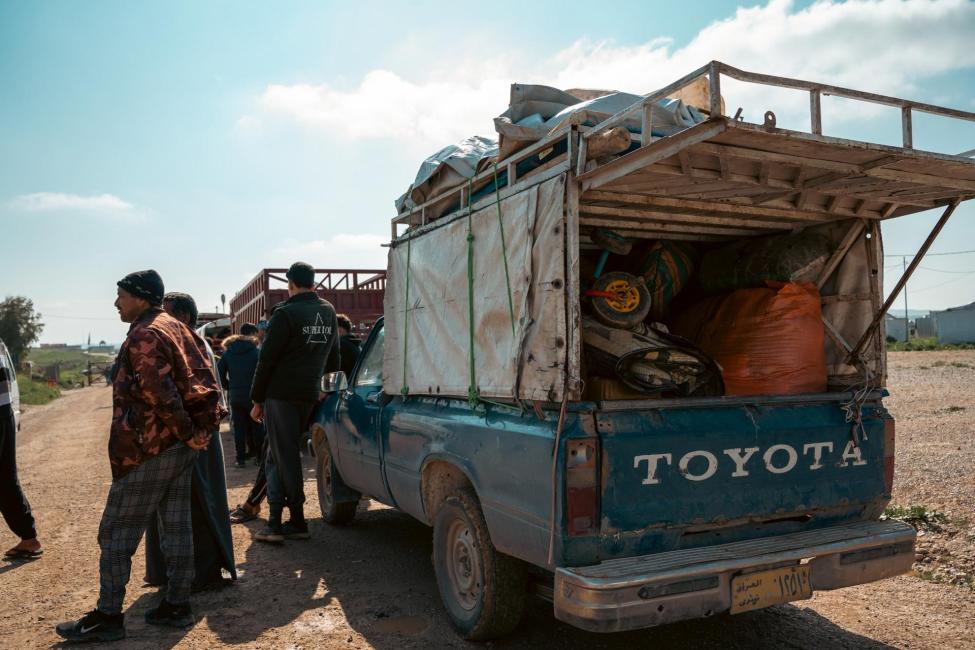-
Who We Are
WHO WE AREThe International Organization for Migration (IOM) is part of the United Nations System as the leading inter-governmental organization promoting since 1951 humane and orderly migration for the benefit of all, with 175 member states and a presence in over 100 countries. IOM has had a presence in Iraq since 2003.
About
About
IOM Global
IOM Global
-
Our Work
Our WorkAs the leading inter-governmental organization promoting since 1951 humane and orderly migration, IOM plays a key role to support the achievement of the 2030 Agenda through different areas of intervention that connect both humanitarian assistance and sustainable development. Across Iraq, IOM provides a comprehensive response to the humanitarian needs of migrants, internally displaced persons, returnees and host communities.
Cross-cutting (Global)
Cross-cutting (Global)
- Data and Resources
- Take Action
- 2030 Agenda
Ninewa, Iraq – On a rainy, early spring day, Noor* sat in the camp management centre at Hassan Sham U2 camp for internally displaced persons (IDP) in Ninewa Governorate, waiting to see her mental health and psychosocial support (MHPSS) counsellor. One could notice a glimmer of hopeful anticipation behind her weathered face... In less than one week, Noor and her family were to return to their home in southern Ninewa after seven years spent in the camp.
“We had to leave out of fear,” Noor said, recalling what brought her to the camp when the conflict broke out. “We had no money and there was no place for us to go. Our house was destroyed. What else were we left to do? We had nothing.” For seven years, he lived in a tent with her three children, mother and siblings. Her father passed away from cancer shortly after the whole family finally settled in the camp.
The loss of her father and the subsequent years of displacement took a major toll on Noor. She felt like her life was out of her control, unable to suppress negative thoughts, and she found it difficult to carry on. At times, Noor projected those difficulties onto her children, which affected their relationships.
While preparing for their departure, Noor sought mental health assistance from the International Organization for Migration (IOM). After several individual counselling sessions and medications prescribed by a psychiatrist, she began noticing improvements in her mood, thinking patterns and overall well-being. “[My counsellor] helped me take ownership of my life,” she shared. “She helped me gain confidence to make my own decisions because before I didn’t have that power. I was always afraid. She helped me believe in myself, rely on myself, and reimagine the future. Now, I am more optimistic for my future.”
Yet, the biggest and the most rewarding achievement for Noor was reconnecting with her children: “They changed when they saw my own change.” Thanks to IOM’s MHPSS sessions, Noor learned coping mechanisms and was more prepared for her return.
“Anything is better than being in this camp,” she exclaimed. “I feel comfortable going back even if I don’t have a house.” Noor and her family plan to set up a tent on their family-owned land until they rebuild their house. Now, her biggest dream is for her children to have their own room. “When I go back, at least I will be living on something I own.”
Noor will continue seeing a counsellor and psychiatrist in her hometown to ensure a smooth transition and reintegration after the return.
Noor’s family is one of 243 households who relocated or returned to areas of their origin around Ninewa and Salah al-Din in the first cohort of people with the support of IOM’s facilitated voluntary movement (FVM) programme. To mitigate possible re-experiencing of difficult events or distressing memories from this process and ensure the safety and security of all families, IOM supports returnees throughout the whole process, from registration to resettlement and beyond, integrating MHPSS services at every stage. Thanks to support from the United States Department of State’s Bureau of Population, Refugees and Migration (PRM), IOM provides services such as stress management, individual and group support sessions, psychoeducation sessions, family visits and referrals to other modalities, based on individual needs.
Since 2020, IOM Iraq has supported more than 4,350 IDPs to find durable solutions through informed and voluntary returns to areas of origin and relocation under FVM. IOM Iraq’s efforts to promote voluntary, safe, dignified and sustainable solutions to displacement are supported by several international partners including the Government of Japan, the Ministry of Foreign Affairs of the Netherlands, the Norwegian Ministry of Foreign Affairs and the United States Department of State’s Bureau of Population, Refugees and Migration (PRM).
*Name is changed to protect identity
